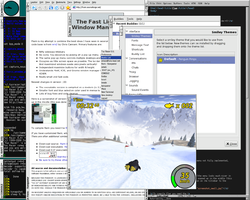This article needs additional citations for verification .(June 2024) |
| Fast Light Window Manager | |
|---|---|
 Screenshot of Fast Light Window Manager | |
| Developer | Bill Spitzak |
| Initial release | 1998 |
| Stable release | |
| Written in | C++ |
| Operating system | Unix-like |
| Platform | Linux |
| Size | i386: 43.6 kB package, 156.0 kB installed, ia64: 58.1 kB package, 216.0 kB installed |
| Type | Stacking window manager |
| License | GPL-2.0-or-later |
| Website | flwm |
The Fast Light Window Manager is an X window manager that is based on FLTK. FLWM is the default window manager for Tiny Core Linux. FLWM was influenced by WM2. [2]